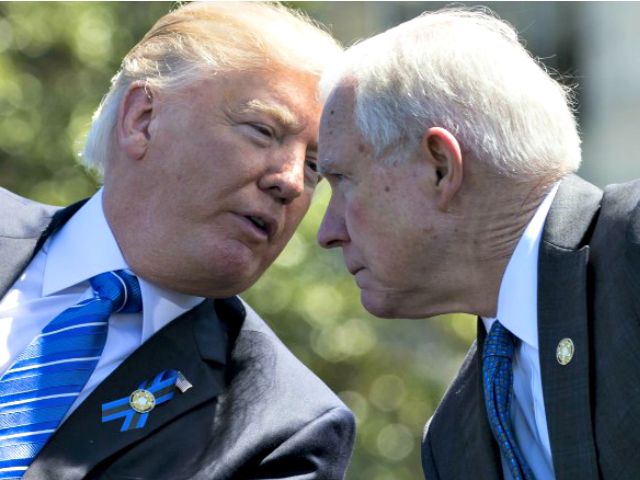Attorney General Jeff Sessions on Thursday issued a forcefully worded response to President Donald Trump’s claim that Sessions “never took control” of the Justice Department (DOJ); then, hours later, the two reportedly worked together without incident.
“I put in an attorney general that never took control of the Justice Department, Jeff Sessions,” the president said in an interview with Fox & Friends Sunday morning. The remarks came as Trump discussed his former lawyer, Michael Cohen, having reached a deal with DOJ prosecutors Tuesday in which he claims he committed campaign finance violations at then-candidate Trump’s behest.
The president also put the blame for his one-time campaign manager Paul Manafort’s conviction the same day by special counsel Robert Mueller’s prosecutors. Mueller was appointed by Deputy Attorney General Rod Rosenstein in May 2017 after Trump fired FBI Director James Comey. The decision was Rosenstein’s to make because, as a participant in the 2016 Trump campaign, Sessions had recused himself of investigations into “Russian collusion.”
“Jeff Sessions recused himself, which he shouldn’t have done or he should have told me,” Trump told Fox & Friends.
“I always put ‘Justice’ in quotes,” Trump added about the DOJ under Sessions, whom he claims to have appointed because he “felt loyalty” after the Sessions endorsement — the first from a sitting U.S. senator.
The attorney general did not take the insult lying down.
“I took control of the Department of Justice the day I was sworn in,” Sessions wrote in a statement issued just hours after the president’s remarks, “which is why we have had unprecedented success at effectuating the president’s agenda–one that protects the safety and security and rights of the American people, reduces violent crime, enforces our immigration laws, promotes economic growth, and advances religious liberty.”
But Sessions warned Trump that he would not allow the Justice Department to be tainted by politics.
“While I am Attorney General, the actions of the Department of Justice will not be improperly influenced by political considerations,” he wrote. “I demand the highest standards and where they are not met, I take action.”
Sessions then praised the Justice Department personnel who work under him, saying they were the most talented and dedicated law enforcement officials in the world and that he was proud to serve with them.
Hours after this latest Sessions-Trump spat unfolded, the attorney general reported to the White House, where he met with President Trump in a previously scheduled meeting about the prison and sentencing reform proposals that reportedly are being heavily pushed by White House adviser and Trump son-in-law Jared Kushner. Sources familiar with the proposals indicate Sessions is generally opposed to them.
Shortly after the meeting let out, two sources told Axios’s Jonathan Swan that Trump’s harsh words and Sessions’ sharp official riposte went totally unmentioned, both men sticking to the business of the day.
According to Sessions’ office, the attorney general even scored something of a victory at the meeting, with the president nixing some of the penalty reduction proposals afoot. “We’re pleased the President agreed that we shouldn’t support criminal justice reform that would reduce sentences, put drug traffickers back on our streets, and undermine our law enforcement officers who are working night and day to reduce violent crime and drug trafficking in the middle of an opioid crisis,” Sessions said in a statement after the Axios report dropped.
President Trump’s attack on Sessions is only the latest in a long series of tensions between the nation’s top law enforcement official and his boss, the President of the United States. These first boiled over last summer when the president began publicly criticizing his attorney general over the handling of the Hillary Clinton email investigation, leading to speculations about Sessions’ replacement and dismay on the populist right, of which Sessions has been a standard bearer for decades.
That round of conflict between Sessions and Trump died down eventually, only to flare back up this spring over Sessions’ decision to rely on DOJ Inspector General Michael Horowitz to investigate political bias in the DOJ investigations. Veterans of the populist-nationalist right again rushed forward to defend the attorney general, and Horowitz eventually delivered strong evidence against FBI Deputy Director Andrew McCabe, and agent Peter Strzok, and other anti-Trump elements in the department. Both McCabe and Strzok were fired based on that evidence, and Horowitz referred the former for criminal prosecution.
Thursday’s battle of words is a return to form at what some see as a critical juncture in the history of the Trump administration, less than three months out from the all-important 2018 midterm elections. Despite the ongoing tensions between Trump and Sessions, the Justice Department under Sessions remains one of the bright spots in the implementation of the Trump agenda. Sessions has managed to implement meaningful reforms and direct strategic litigation against so-called “sanctuary” jurisdictions that, together, make a return to credible immigration enforcement, the 2016 Trump campaign’s central axis, possible. He also has begun a serious push to put the protection of religious freedom at the top of the department’s priorities and worked to rid the DOJ of legacy ties to left-wing groups like the Southern Poverty Law Center (SPLC) that paint Christian public interest law firms as “hate groups.”
Speculation continues in Washington that Trump will try to replace Sessions after the midterms, but with the makeup of the Senate at that point impossible to predict, confirming any replacement acceptable to the president’s conservative base may prove difficult.
Charlie Spiering contributed to this article.

COMMENTS
Please let us know if you're having issues with commenting.